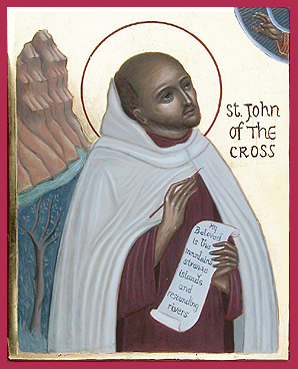Father, You endowed John of the Cross with a spirit of self-denial and a love of the cross. By following his example, may we come to the eternal vision of Your glory.

THE best exposition on the spiritual life --that is, in my estimation there is no other work that captures the essence of the various gifts of the Holy Spirit with regard to the spiritual life-- is the book Christian Spirituality by Dominican Father Jordan Aumann (1916-2007). Regrettably, I think the book is out of print and old copies tend to be expensive but you may search for an online copy of it. If you get a copy, don't let it out of your sight! Nevertheless, Father Jordan's thoughts on Saint John of the Cross easily expose the greatness of today's saint.
The fundamental principle of St. John's theology is that God is All and the creature is nothing. Therefore, in order to arrive at perfect union with God, in which sanctity consists, it is necessary to undergo an intense and profound purification of all the faculties and powers of soul and body. The Ascent--Dark Night traces the entire process of purgation, from the active purification of the external senses to the passive purification of the highest faculties; The Living Flame and The Spiritual Canticle describe the perfection of the spiritual life in the transforming union. The entire path to union is "night" because the soul travels by faith. St. John of the Cross presents his teaching in a systematic manner, with the result that it is spiritual theology in the best sense of the word; not because it is systematic, but because it uses as its sources Sacred Scripture, theology and personal experience.
In speaking of the union of the soul with God, St. John states that he is speaking of supernatural union, and not the general union by which God is present to the soul simply by preserving it in existence. The supernatural union of the mystical life is a "union of likeness" which is produced by grace and charity. But in order that this union of love be as perfect as possible and as intimate as possible, the soul must rid itself of all that is not God and of every obstacle to the love of God so that it can love God with all its heart and soul and mind and strength.
Since any deficiency in the union of love is due to the soul and not to God, St. John concludes that the soul must be completely purified in all of its faculties and powers -- those of the sensory order and those that are spiritual -- before it can be fully illuminated by the light of divine union. This results in the "dark night," which is so called because the point of departure is a denial and deprivation of one's appetite or desire for created things; the means or the road along which the soul travels to union is the obscurity of faith; and the goal is God, who is also a dark night to man in this life.
The necessity of passing through this dark night is due to the fact that from God's point of view, man's attachments to created things are pure darkness, while God is pure light, and darkness cannot receive light (Jn. 1:5). Stated in philosophical terms, two contraries cannot coexist in the same subject. The darkness which is attachment to creatures and the light which is God are contraries; they cannot both be present in the soul at the same time.


Leave a comment